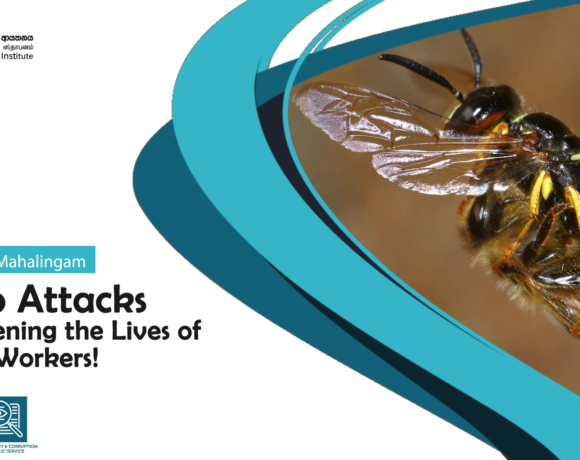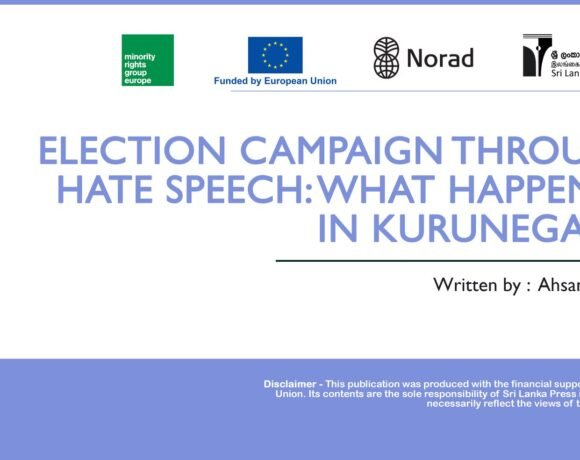
Freedom of Speech in the Face of Quarantine Law
Kamani Hettiarachchi
Recently, the Sri Lankan Police arrested several protesters on the charge of violating quarantine laws. This happened both in Colombo and places outside where public dissent against the government was being demonstrated. Another group of 32 was taken to quarantine centres, but were later released. Protests were spearheaded by university students, trade unions, and civil society organizations against the government’s attempt to pass the Kotelawala Defense University Act in parliament. In addition, the government’s decision to abruptly ban imports of chemical fertilizers and the crisis faced by farmers due to the shortage of compost fertilizer, as well as rising fuel prices led to protests in various parts of the country.
Dissent and detention during Covid-19
Opposition political parties, trade unions, civil society organizations, the legal community, and student organizations have repeatedly accused the government of using quarantine laws to suppress the freedom of speech and expression. When questioned by the opposition political parties in Parliament on 9 July 2021, the Minister of Public Security, Rear Admiral Sarath Weerasekera, stated that those who violateed quarantine laws would continue to be arrested.
A “Colombo Page” report cited the Bar Association of Sri Lanka (BASL) as stating that quarantine, which was a health measure, should not be used as a punishment or detention.
The United Nations Resident Coordinator in Sri Lanka, Hanaa Singer, said in a statement issued on Twitter on 11 July that the legal limits of Covid-19 control should not go beyond the demands of public health. The Government Medical Officers’ Association (GMOA) stated on 12 July that the government was abusing the quarantine laws. Several statements from Ministers and MPs indicated that the government’s own position on quarantine regulations and the emerging debate of how they impact the rights to freedom of expression are in conflict. It was evident from statements by two MPs from the Colombo District, Premanath Dolawatta and Sarath Weerasekera, who were on the same stage expressing conflicting views on the matter. While the Minister justified quarantining protesters, other government MPs and Ministers were seen on occasion to criticize such policing. The Minister of Public Defense further stated that the police took those actions based on the instructions and recommendations given to the IGP by the health authorities.
Quarantine Law in Sri Lanka
Sri Lanka’s quarantine law contains provisions on how to deal with epidemics. The law that is in use in Sri Lanka at the moment was introduced by the British colonialists in 1897 under the Quarantine Act. At various points in history, new regulations were introduced to the Act as and when required. Many experts believe that a new quarantine law is overdue. Dr. Hemantha Herath, the Deputy Director-General of the Ministry of Health, recently stated that about 500 proposals to amend the Quarantine Act had already been submitted to the Ministry of Health. He said that the Ministry was studying those proposals extensively. Dr. Herath stated that if the fundamental law is to be changed, it must be amended in agreement with the international human rights law. However, the office of the Director General of Health issues and maintains necessary regulations from time to time to deal with the Covid-19 situation.
The Minister of Justice M.U.M Ali Sabri had recently introduced a temporary provisions bill called the Corona Viral Diseases (Covid-19) Bill. A three-judge bench comprising Justices Murdu Fernando, Yasanthe Kodagoda, and A. H. M. D. Navas issued an order after considering the petition filed by Attorney-at-Law Aruna Laksiri challenging the constitutionality of the bill.
Accordingly, the Speaker announced in parliament that he had been informed of contradictions between the bill and Articles 3, 4 (c) and 12 of the constitution. Those had to be read with Articles 2,3,4,6,7 and 10 of the relevant Bill. As reported in the “Lankadeepa” newspaper, the supreme court ruled that the bill had to be passed by a special majority vote in accordance with Article 84 (2) of the constitution and approved in a referendum. It also stated that the bill could be passed by a simple majority if amended as stated by the supreme court.
Deputy Solicitor General Nerin Pulle, who appeared before the supreme court on behalf of the Attorney General, stated that amendments would be made to the relevant bill and would be presented during the committee stage in the parliament.
Freedom of speech
Meanwhile, six fundamental rights petitions have already been filed in the supreme court in connection with the controversies surrounding the quarantining of protesters. The Samagi Jana Balawegaya and the Ceylon Teachers’ Union have filed six fundamental rights petitions in the supreme court against the Inspector General of Police, the Director-General of Health, the Attorney General and the Minister of Health. The petitioners state that the manipulation of health guidelines and the Quarantine Act issued by the Director-General of Health Services to control the Covid-19 pandemic in order to suppress peaceful protests violates the freedom of speech and expression guaranteed by the constitution.
The freedom of speech and expression is recognized as a fundamental right under the Sri Lankan constitution and other international conventions. Article 14 (1) (a) of the 1978 Constitution of the Democratic Socialist Republic of Sri Lanka recognizes freedom of expression as a fundamental right. It mentions that “every citizen has the right to freedom of speech and expression”. Articles 15 (2) and 15 (7) of the constitution state the limits on fundamental rights. Accordingly, several notable judgments have assured the right to speech and expression in the country. Among them are the rulings on peaceful democratic protests as well as decisions on their limitations. With such precedents in place, the public is eager to see how the supreme court rules in a time of pandemic.
නිරෝධායන නීතිය හමුවේ භාෂණයේ නිදහස








